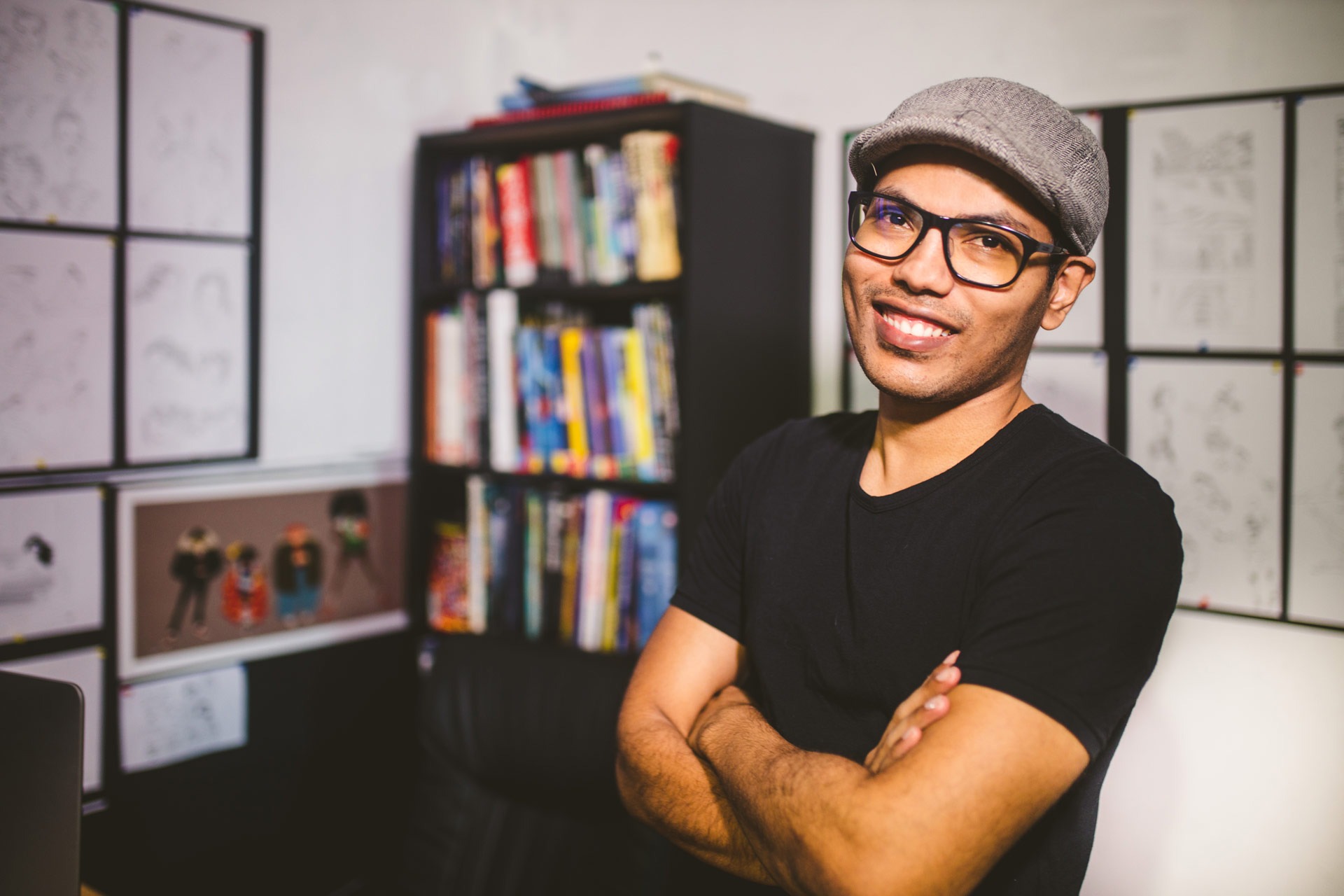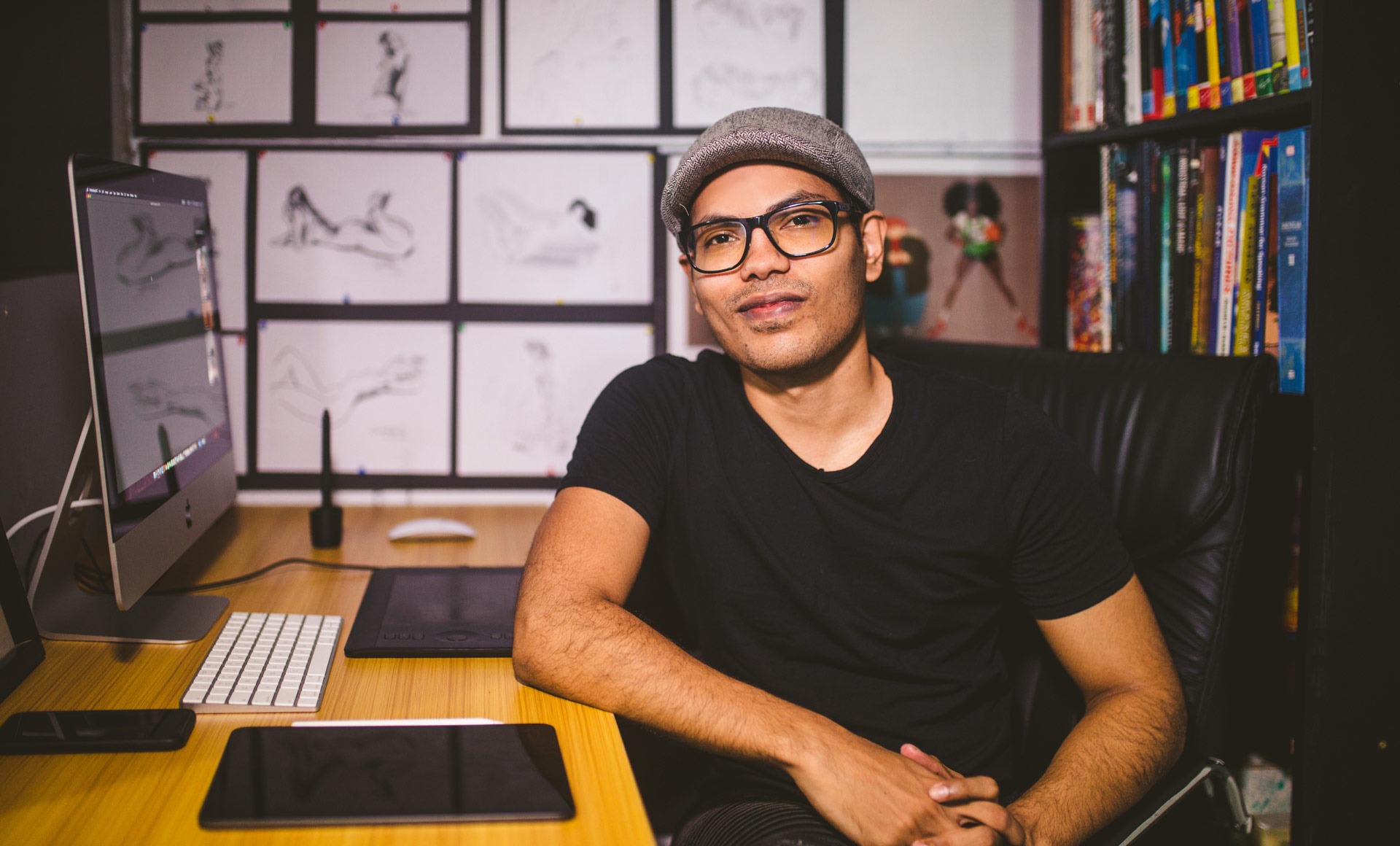
26 Aug Stick to Plan A: How Rajendra Ramkallawan Moved From Comic Enthusiast to Pivot Book Illustrator to Netflix Story Artist
The Pivot movement’s definition of a future maker is anyone who has the ideas, the will, and the commitment to create a new and brighter future. This post features Rajendra Ramkallawan, one of the illustrators of the Pivot Book and a Caribbean future maker in his own right.
Comics and Saturday morning cartoons were not just entertainment, they were inspiration for young Rajendra Ramkallawan, a feature film story artist from Trinidad and Tobago. His illustrations appear on the cover and within the pages of Pivot: The Future Makers, a publication of moonshots (big ideas) for the Caribbean thought up at the inaugural Pivot Event hosted by the IDB and its partners in 2020.
Rajendra is now part of a Netflix team for a new animated film in development. But the road to that achievement was certainly not laden with opportunity. Rajendra faced the chronic barriers to a career in the arts that exist in small markets with undeveloped industries. Even though he was able to complete a degree in visual arts at the University of the West Indies, St. Augustine, there was no specialisation in illustration or graphic storytelling, an area that he became increasingly fascinated with.
After he graduated in 2014, he looked to online resources to help him to develop those skills despite limited market demand for it in his home country. Rajendra doggedly pursued the specialty because as he says,
“I just couldn’t see myself doing anything else besides the type of art I wanted to do…I didn’t have a plan B. I always had a plan A and if that plan A failed, I’d just have another plan A…”
Following over a year of online research and learning in storyboarding and related specialties, plan A yielded a glimmer of success. Rajendra applied and was accepted to work as an intern at leading South Korean CGI animation studio, Funny Flux. He worked on the popular kids show Super Wings which has been broadcast in over 96 countries including Germany, Italy, the USA and China (according to Korean content curation site WeICon). Rajendra remained in South Korea from April to October of 2017 then returned home, again to limited opportunity in his area.
But plan A was still in effect and he founded Emotion Illustration in October 2018 to somehow find a channel to help people feel emotion through his art and to get paid for it. Ramkallawan credits his parents for being extremely supportive throughout this time though his dream seemed “futile”. Soon, however, their patience and his hard work started to pay off.
By December 2018 he says, “I actually found a way to break into a market that doesn’t care about art by doing live caricatures for people who want themselves to be drawn.” Ramakallawan would do 50 or more drawings per sitting, of people attending weddings or other events. This became the core business of Emotion Illustration, complemented by digital illustration assignments.
Rajendra kept going. And it paid off, as he was then contacted to illustrate for the Pivot Book and later, through a personal contact, was introduced to a Netflix Executive, ultimately resulting in his latest gig.

Illustrating for the Pivot Book
In the Pivot Book, moonshots for Caribbean development are seen through the eyes of the fictitious Singh-Smith family and run the gamut from an undersea master control centre to amphibious medevacs. Of his experience working on the project, Rajendra recalls that the opportunity to work closely with a writer and with the IDB’s team to define the story’s characters and give life to the imagined Caribbean of 2040 was especially interesting.
When asked what he would want the Caribbean of 2040 to be like he insightfully shared that, “In the Pivot Book the Caribbean looks very advanced in terms of technology… but … what I want the Caribbean to advance to is a place where all basic needs are met for everyone of any economic class.”
He believes that the role of creatives in realising that future is to tell Caribbean stories objectively and from the perspective of varying socioeconomic groups, about the challenges that the region faces. This, he believes, would lead to more equitable solutions.
Putting Moonshot Thinking in Perspective and Advice for Aspiring Career Artists
His perspective on moonshot thinking aligns closely with other Pivot Future Makers, “ I think the future is something we usually have expectations of and we plan for the future but the world is constantly changing. It’s always going in new places that we never predicted and I think people, especially artists, need to be very adaptable to the changes that the world makes. So for instance you might be having a goal to go to Hollywood but ten, twenty years from now that might not exist. So you just need to be ready that anything could happen and anything could throw off your plans. You need to be ready to adapt to that situation.”
Rajendra advises young artists aspiring towards a fulfilling career, to avoid chasing what seems to work for other people, master the area they love and make it their signature.
Perhaps one essential takeaway from Rajendra Ramkallawan’s journey so far for Caribbean artists and or future makers alike is this, stick to plan A and make it work.

